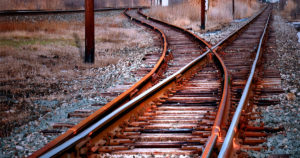Preventing Tragedies at Train Crossings
November 18, 2020 Did you know that it is illegal to be on or near train tracks in a vehicle unless you are at a designated crossing? This is because train accidents can cause deadly injuries. In fact, people are injured or killed at train crossings in the United States every day. According to the National Highway Transportation Safety Administration (NHTSA), between 2014 and 2018 there were 798 fatalities involving motor vehicles at railroad crossings. Though they happen daily, the majority of these incidents are actually preventable.
Did you know that it is illegal to be on or near train tracks in a vehicle unless you are at a designated crossing? This is because train accidents can cause deadly injuries. In fact, people are injured or killed at train crossings in the United States every day. According to the National Highway Transportation Safety Administration (NHTSA), between 2014 and 2018 there were 798 fatalities involving motor vehicles at railroad crossings. Though they happen daily, the majority of these incidents are actually preventable.
One of the main reasons it is so critical to avoid train tracks (unless you are waiting at a crossing) is because trains can take a mile, and sometimes even more, to come to a full and complete stop. Trains are also three feet wider on both sides than the width of train tracks, so keeping a safe distance can quite literally make the difference between life and death. Yet another reason it is so important to exhibit caution at a railroad crossing is that even if one train passes by, another one could still be coming.
Human Error, Safety Failures, and Other Factors in Train Accidents
Even when pedestrians and motorists follow the rules at railroad crossings, deadly accidents still happen. According to the U.S. Department of Transportation (DOT), human factors such as alcohol and drug use by operating employees in addition to severe fatigue and other types of sleep disorders cause 37% of train accidents. Train collisions and accidents are the second-leading category of fatalities associated with railroading, indicating a need for a major safety overhaul throughout the industry.
Other contributing factors in deadly train accidents include broken rails, defective wheels, improper operation of control systems, trains operating without safety horns or alert whistles, and brake failures. In some cases, a lack of track inspection and maintenance leads to these preventable incidents. In others, protective systems (e.g. brakes) fail because of product design defects or improper use. Although there are federal standards in place aimed to reduce the rate of preventable train collisions, many accidents have happened because engineers or crewmembers fail to abide by the requirements. For example, a fatal crash where more than 100 people were injured and one was killed in New Jersey’s Hoboken Terminal was linked to the engineer’s failure to sound the train horn while he navigated crossings.
Railroad Crossing Safety Tips
While many train accidents result from human error, signal or track failures, defective parts and failed safety features, there are still steps people can take to reduce their chance of being in a train accident. This means limiting all distractions, paying attention, and never trying to “beat” a train at a crossing. Here are just a few more safety tips for preventing major rail-related accidents:
- Pedestrians should cross quickly. If you are crossing with a bicycle, stroller, or wheelchair, cross at a 90° angle to prevent the wheels from getting stuck
- Always look both ways before crossing and follow all posted signage and instructions
- If you are in a vehicle, make sure there is adequate space on the other side of the train tracks for your vehicle to cross safely
Injured in a Train Accident?
Determining liability after a train accident is a complex process. It is critical to examine all factors such as the design, maintenance, and operation of the railroad tracks and the train, in addition to the behavior and actions of the conductor and crewmembers leading up to the incident. Because determining liability can be so complicated, it is important to have an experienced attorney on your side. If you or a loved one was injured in a train accident, someone at our firm can help. Contact a representative online now.
Philadelphia Personal Injury Lawyers at Galfand Berger, LLP Representing Victims of Train Accidents Since 1947
Galfand Berger has offices located in Philadelphia, Bethlehem, Lancaster, and Reading, we serve clients throughout Pennsylvania and New Jersey. To schedule a consultation, call us at 800-222-8792 or complete our online contact form.
 Google Screened
Google Screened
